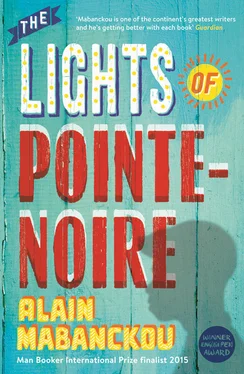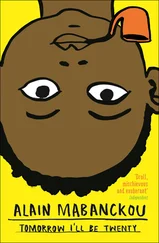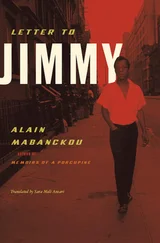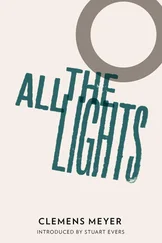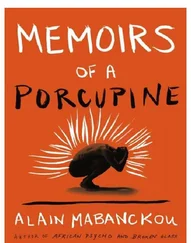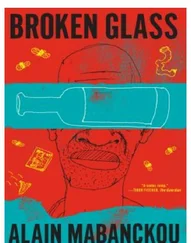To redeem myself in my sisters’ eyes, I secretly ate the food my mother continued to leave out for them each night, by the door, and told myself that whatever went into my stomach also went into theirs. In the morning, my mother was astonished to find the empty plates, and would reprimand Miguel, who would turn to me with a look of red-eyed reproach. But when I gently stroked him he at once grew calm, for he alone understood the true depth of my sadness…
My father was a small man, two heads shorter than my mother. It was almost comic, seeing them walking together, him in front, her behind, or kissing, with him standing up on tiptoe to reach. To me he seemed like a giant, just like the characters I admired in comic strips, and my secret ambition was one day to be as tall as him, convinced that there was no way I could overtake him, since he had reached the upper limit of all possible human growth. I realised he wasn’t very tall only when I reached his height, around the time I started at the Trois Glorieuses secondary school. I could look him straight in the eye now, without raising my head and waiting for him to stoop down towards me. Around this time I stopped making fun of dwarves and other people afflicted by growth deficiency. Sniggering at them would have meant offending my father. Thanks to Papa Roger’s size I learned to accept that the world was made of all sorts: small people, big people, fat people, thin people.
He was often dressed in a light brown suit, even when it was boiling hot, no doubt because of his position as receptionist at the Victory Palace Hotel, which required him to turn out in his Sunday best. He always carried his briefcase tucked into his armpit, making him look like the ticket collectors on the railways, the ones we dreaded meeting on the way to school when we rode the little ‘workers’ train’, without a ticket. They would slap you a couple of times about the head to teach you a lesson, then throw you off the moving train. The workers’ train was generally reserved for railway employees, or those who worked at the maritime port. But to make it more profitable, the Chemin de fer Congo-Océan (CFCO) had opened it to the public, in particular to the pupils of the Trois Glorieuses and the Karl Marx Lycée, on condition they carried a valid ticket. As a result they became seasoned fare dodgers, riding on the train top, in peril of their lives. It was quite spectacular, like watching Fear in the City at the Cinema Rex, to see an inspector pursuing a pupil between the cars, then across the top of the train…

Papa Roger walked with a lively step, his eyes glued to his watch — which made my mother say he was the most punctual man on earth. With him everything was timed to the exact minute. He left the house at six in the morning, took the bus on the Avenue of Independence, opposite the Photo Studio Vicky, and arrived in the centre of town half an hour later.
At seven o’clock on the dot he was in the reception of the Victory Palace, straight as a rod, greeting the first clients of the day, as they made their way to the restaurant for breakfast. He stood at the desk and scanned from the hotel entrance to the street outside. As soon as he saw a new client getting out of a car, he shook a little bell. Two uniformed employees came running up to the main entrance, grabbed their suitcases and deposited them at reception. They then took them up to the upper floors after my father had filled out the registration forms and assigned them a room. He took a sly pleasure in describing this procedure to us at table in the evening. It was difficult for him to conceal a kind of pride which, in my mother’s eyes, was nothing but bluster. He would stop in the middle of eating and crow:
‘I’m the most important employee at that Victory Palace! It’s me, no one else, who decides what room to put a client in! If they look like a jerk — you get a lot of them with these Europeans on holiday — I don’t offer them the good room with the view of the garden. I keep that for the clients I like, the regulars who come back every year. Sometimes I might give someone a bad room to start off with, if I don’t know them, and then if they’re nice to me during their stay I’ll switch them. They usually remember I’ve done that when they leave, and they’ll give me a big tip!’
He got back from work at five in the evening, bringing a few French magazines, which he read at table after dinner, reacting out loud to what he read:
‘What? Not possible! I don’t believe it! Why on earth did they do that? The French are mad!!’
At the weekend he wore white pyjamas with red stripes, and brown slippers that were too big for his feet. They were a present, he reminded us, from his boss, Mme Ginette.
‘Even if they were too small for me, I’d wear them, a present’s a present! They’re called charentaises , no one else in this town has them! They’re so splendid, I know people who’d wear them to go walking round town in, if they had a pair! But they’re meant for staying at home in, and reading the paper. That’s what they do in Europe!’
He’d sit down on the doorstep in the morning, and continue his perusal of the newspapers that sat in a pile next to him, with a stone on top, to stop them blowing away in the wind. He forgot to drink the coffee my mother set down just next to him, concentrating on turning the pages, turning back to something he’d read a few minutes before and grabbing a red pen to scrawl on it. Then he’d suddenly break off reading, glance over at me, and notice I was sitting there under the mango tree with my jaw dropping in admiration.
‘You want to read with me? Come on, then!’
I’d dash over to him, having waited impatiently for this moment. He read to me what he called the ‘world news’. I quickly learned the more complicated names of foreign countries and their leaders. Europe, America, Asia or Oceania ceased to feel like distant lands. I noticed my father used his red pen to underline the more difficult French words.
‘I’ll check those words on Monday in the dictionary at the Victory Palace… I need to learn them so I can use them at the right moment with the clients.’
Picking out two more, and underlining them irritably, I heard him grumble:
‘I don’t understand why people don’t write simply, why they have to write words no one understands! Antediluvian , for example, or apocryphal , what’s that mean?’
Indignantly, he turned the page. Here was the world news. He looked displeased as he grumbled:
‘For goodness’ sake, the French are crazy! Why don’t they talk about what’s happening in our country? We’ve had a coup d’état here, and there’s not one line about it! President Marien Ngoubai was murdered last week! The French are in league with them, they must be, they can’t possibly not mention it! The French are behind the whole thing!’
Seeing I said nothing, he went on:
‘I’ll tell you something, my boy, now you listen to Roger! They don’t talk about us because our country’s too small! And because it’s too small, people forget about it, and think it’s only other countries that have mosquitoes, and poverty and civil wars. Not true! We’ve got every problem there is here, you only have to look around you! It’s always the same, in the sea people only think about the sharks and the whales, because they make all the noise! No one thinks about the small fry who are just there to get eaten by the big fish!’
My mother became aware of my increasing fascination with Papa Roger and his reading, and began to get a little jealous. As soon as my father was gone she grabbed hold of the newspaper and withdrew to a corner of the yard with her back to a mango tree, saying:
Читать дальше
